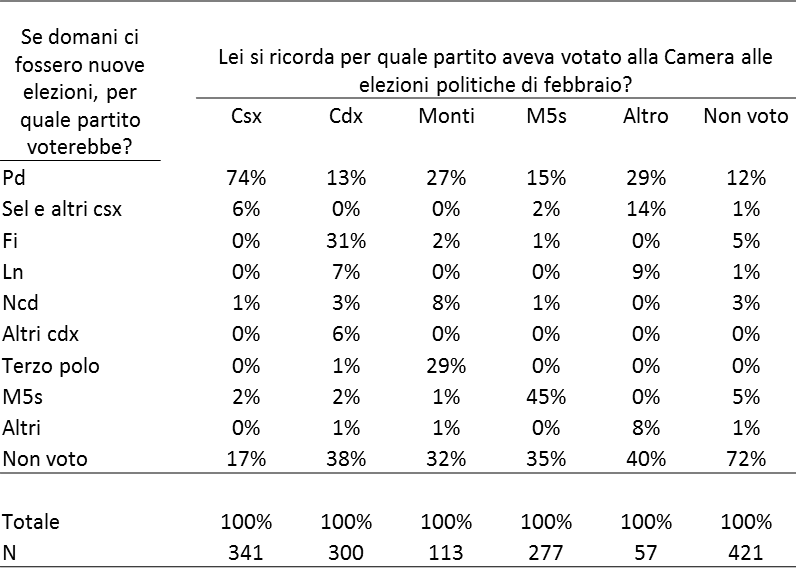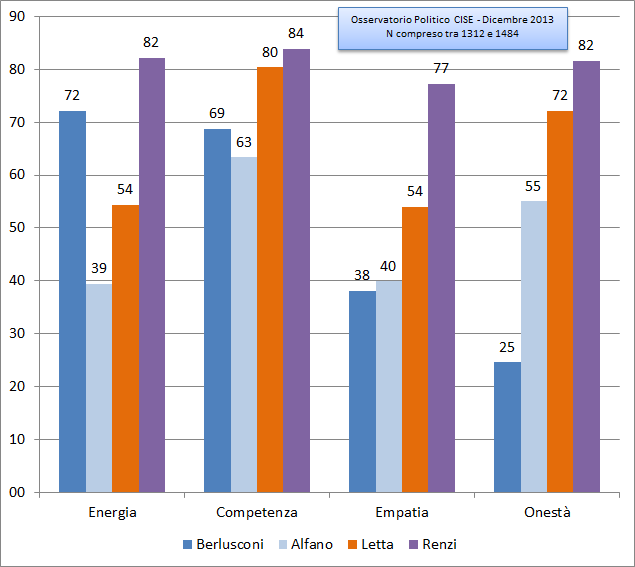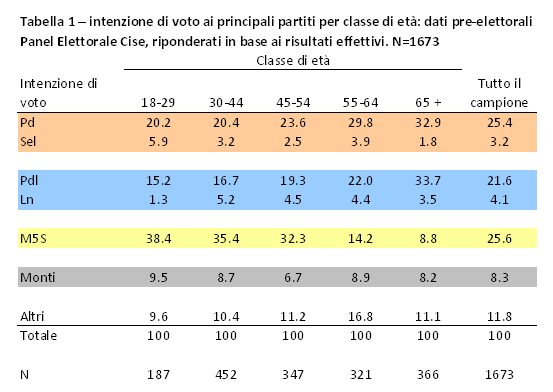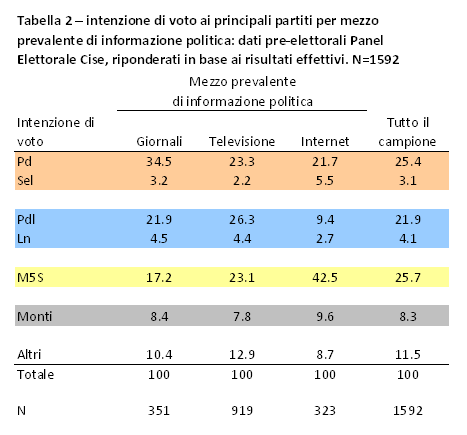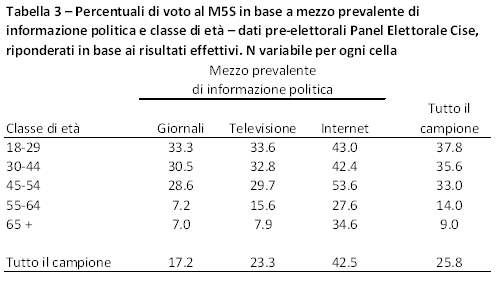di Lorenzo De Sio
Un paese inquieto. Stretto tra l’insoddisfazione per il presente della politica (e, in modo crescente, anche per il processo di integrazione europea), il disagio per una crisi economica che non accenna a placarsi (vedi l’analisi di Vincenzo Emanuele), e al tempo stesso la disponibilità ad aprire un credito a proposte politiche potenzialmente nuove – quella del neosegretario Pd Renzi in primis (vedi l’analisi). E’ quello che emerge dalle analisi tratte dall’indagine Osservatorio Politico CISE del dicembre 2013. Ma qual è – se esiste – il filo rosso che unisce dati apparentemente ambigui e contraddittori? Qual è una possibile chiave di lettura? Cosa si muove sottotraccia nell’Italia inquieta del 2014?
E’ difficile cercare una risposta a questa domanda senza chiamare in causa quel processo politico profondo che sta scuotendo l’intera Europa occidentale. Uno scontro il cui clangore delle armi si comincia a sentire già ora, e che molto probabilmente ci riserverà sviluppi politici difficili nei prossimi mesi e ancor più nei prossimi anni, catalizzati dalle elezioni europee di fine maggio. Si tratta di un processo invero abbastanza semplice, come ha suggerito pochi giorni fa Nadia Urbinati su Repubblica[1].
Da anni le istituzioni europee (secondo una visione dell’economia globale che è in linea con quella del mondo economico e finanziario internazionale) stanno forgiando una particolare visione della cittadinanza europea. Una visione che pone la massima enfasi sulla libertà. In cui ciascun cittadino viene dotato di un “kit” di base di diritti e libertà essenziali, con cui poi andarsene in giro per la vasta Europa, appeso a poco più che le sue capacità di iniziativa e di riuscita individuale. Con la possibilità di raggiungere i traguardi più alti, ma anche (e forse più spesso) di sprofondare nella miseria più nera. In altre parole, una visione molto simile a quella che da secoli anima gli Stati Uniti, non l’Europa.
Europa in cui viceversa la cittadinanza – da secoli – è sempre stata costruita e fondata essenzialmente sull’uguaglianza. Attraverso processi di inclusione sociale, tesi proprio ad alleviare l’estrema miseria e disuguaglianza, e a tenere i cittadini uniti in reti di protezione sociale (quelle reti il cui progressivo smantellamento sembra essere divenuto il punto principale dell’agenda politica europea).
Che questa visione di cittadinanza sia quella più consona alla maggior parte dei paesi europei è confermato chiaramente anche nel caso dell’Italia, in base ai nostri dati. Su una domanda tesa a misurare la disponibilità a sacrificare il welfare in nome di una minore pressione fiscale (la classica dimensione “egualitarismo/liberismo”), gli italiani infatti si pronunciano chiaramente a favore del welfare. In misura massiccia (75%) e assolutamente trasversale agli schieramenti (vedi l’analisi di Aldo Paparo).
 Non diversamente dagli altri grandi paesi europei. E quindi ne scaturisce uno scontro che è ormai diventato inevitabile e ineludibile, e che potrebbe emergere come un asse comune in grado di orientare il voto alle prossime elezioni europee in vari paesi. Quello che vede da un lato i fautori di un’idea liberista di Europa, sorretti dal mantra del rigore di bilancio e del contenimento del debito. E, per adesso, dall’altro lato un fronte sempre più agguerrito che, nel rivendicare il primato dell’uguaglianza (su base, però, etnica), si mostra ben disponibile a sacrificare pezzi enormi di libertà e diritti della democrazia. Così la notizia dell’alleanza di ferro tra Marine Le Pen e Geert Wilders, populisti eleganti ma xenofobi in Francia e Olanda, entrambi dati in grande ascesa – ed eccitati all’idea di estendere il patto a Beppe Grillo (anche se per adesso pare che il loro partner italiano sarà la Lega Nord). Un’alleanza cementata dall’ostilità verso l’integrazione europea, ma soprattutto da quella verso gli immigrati, visti come responsabili della crisi economica e soprattutto come minaccia al welfare e ai valori europei. Che vede al centro la dottrina della preferenza nazionale, elaborata per primo da Le Pen padre: “prima i francesi!”. Dottrina che, introducendo una nozione di cittadini di serie A e B, configura proprio il sacrificio dei diritti (e della democrazia) nel nome di una presunta uguaglianza su base etnica. Con sviluppi non difficili da immaginare, se si guarda alla storia d’Europa.
Non diversamente dagli altri grandi paesi europei. E quindi ne scaturisce uno scontro che è ormai diventato inevitabile e ineludibile, e che potrebbe emergere come un asse comune in grado di orientare il voto alle prossime elezioni europee in vari paesi. Quello che vede da un lato i fautori di un’idea liberista di Europa, sorretti dal mantra del rigore di bilancio e del contenimento del debito. E, per adesso, dall’altro lato un fronte sempre più agguerrito che, nel rivendicare il primato dell’uguaglianza (su base, però, etnica), si mostra ben disponibile a sacrificare pezzi enormi di libertà e diritti della democrazia. Così la notizia dell’alleanza di ferro tra Marine Le Pen e Geert Wilders, populisti eleganti ma xenofobi in Francia e Olanda, entrambi dati in grande ascesa – ed eccitati all’idea di estendere il patto a Beppe Grillo (anche se per adesso pare che il loro partner italiano sarà la Lega Nord). Un’alleanza cementata dall’ostilità verso l’integrazione europea, ma soprattutto da quella verso gli immigrati, visti come responsabili della crisi economica e soprattutto come minaccia al welfare e ai valori europei. Che vede al centro la dottrina della preferenza nazionale, elaborata per primo da Le Pen padre: “prima i francesi!”. Dottrina che, introducendo una nozione di cittadini di serie A e B, configura proprio il sacrificio dei diritti (e della democrazia) nel nome di una presunta uguaglianza su base etnica. Con sviluppi non difficili da immaginare, se si guarda alla storia d’Europa.
Che non si tratti di speculazioni astratte lo dicono anche i dati del nostro recente sondaggio, in cui abbiamo voluto testare la presenza in Italia di potenziali atteggiamenti di welfare chauvinism [Andersen e Bjørklund 1990]. Scoprendo che circa il 58% degli italiani è d’accordo con il fatto che il welfare dovrebbe sempre dare la precedenza agli italiani sugli immigrati. Questo tema finora è stato confinato alla nicchia della Lega Nord; tuttavia Grillo in più di una occasione ha ammiccato visibilmente in quella direzione. Sarà un tema chiave delle prossime elezioni europee?
Lo sarà, forse, soprattutto se continuano a latitare quelle posizioni che potrebbero proporre una soluzione al dilemma; ovvero proposte per riformare profondamente i sistemi di welfare europei, mantenendo tuttavia una visione attenta all’uguaglianza, e evitando le tentazioni liberiste che si sono finora imposte nel progetto europeo. E senza introdurre discriminazioni che distruggerebbero i diritti della democrazia.
Su questo finora i partiti della sinistra europea hanno decisamente latitato. Tuttavia, ad esempio nel caso italiano, i nostri dati mostrano come – dietro apparenti contraddizioni – si aprano degli spazi di opportunità. La contraddizione apparente è quella mostrata da Aldo Paparo, quando osserva che la maggioranza degli italiani è su posizioni in un caso di sinistra (la maggioranza del 75%, vista poc’anzi, per mantenere il welfare) e nell’altro di destra (il 54% del campione ritiene che i sindacati oggi in Italia abbiano troppo potere). In realtà non è difficile immaginare la composizione di questa contraddizione: si tratta di un atteggiamento che riconosce la necessità (e la possibilità) di cambiare alcuni degli strumenti per assicurare l’uguaglianza, senza tuttavia mettere in discussione i valori stessi di uguaglianza. Non deve quindi – ad esempio – sorprendere la curiosa convergenza di posizioni tra Renzi e il segretario della Fiom Landini, proprio sui temi del lavoro e del welfare. E non stupiscono i dati (mostrati da Nicola Maggini) che mostrano come il successo di Renzi alle primarie sia stato nettissimo anche tra gli elettori di sinistra.
Si tratta quindi forse di una finestra di opportunità che sembra aprirsi tra gli elettori italiani. Consapevoli che un’epoca si è chiusa, e che la crisi deve portare a ripensare gli strumenti dell’uguaglianza; tuttavia altrettanto consapevoli che quest’uguaglianza non può e non deve essere sacrificata. In un momento in cui il pallino della politica italiana sembra in mano al centrosinistra, e in particolare al neosegretario del Pd Renzi, sembra naturale che sia proprio Renzi a cercare di raccogliere questa sfida, che tra l’altro gli permetterebbe di riempire di contenuti una leadership che appare sì molto forte e molto trasversale (vedi l’analisi) ma ancora difficile da decifrare. Offrendo forse una soluzione all’Italia inquieta del 2014.
Riferimenti bibliografici
Andersen, Jørgen Goul e Tor Bjørklund (1990). “Structural Change and New Cleavages: The Progress Parties in Denmark and Norway”, Acta Sociologica 33 (3), pp. 195-217.
[1] La destra anti-europea, 21 dicembre 2013.

